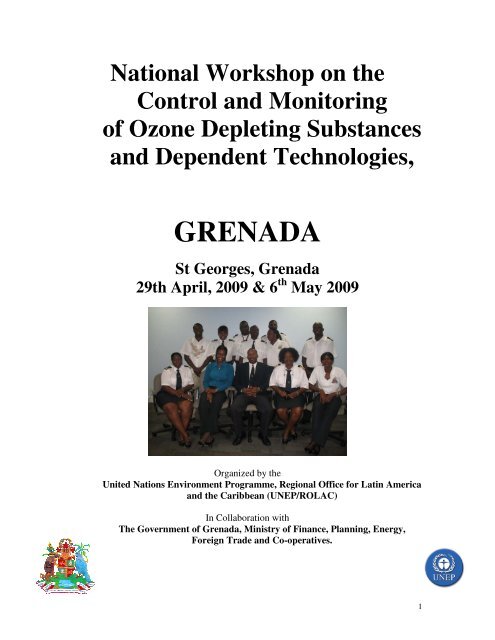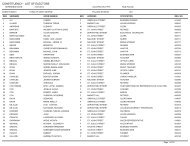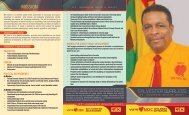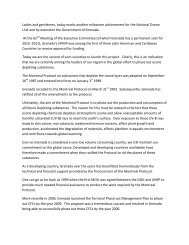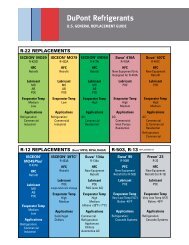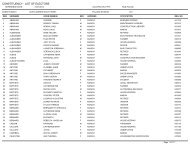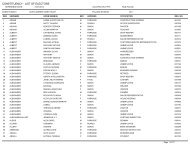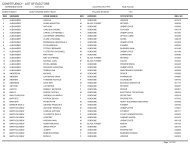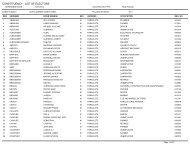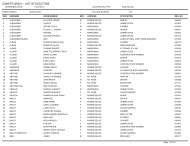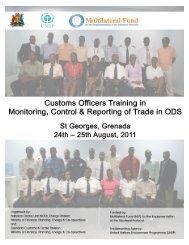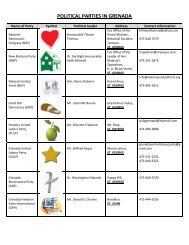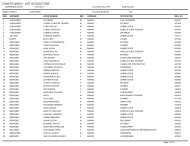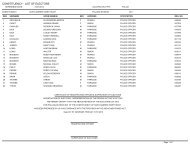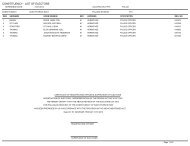Workshop Report - Computer Information Systems Grenada
Workshop Report - Computer Information Systems Grenada
Workshop Report - Computer Information Systems Grenada
Create successful ePaper yourself
Turn your PDF publications into a flip-book with our unique Google optimized e-Paper software.
National <strong>Workshop</strong> on theControl and Monitoringof Ozone Depleting Substancesand Dependent Technologies,GRENADASt Georges, <strong>Grenada</strong>29th April, 2009 & 6 th May 2009Organized by theUnited Nations Environment Programme, Regional Office for Latin Americaand the Caribbean (UNEP/ROLAC)In Collaboration withThe Government of <strong>Grenada</strong>, Ministry of Finance, Planning, Energy,Foreign Trade and Co-operatives.1
TABLE OF CONTENTSExecutive Summary 31. Background 42. Objectives 53. Expected results 54. Participants and speakers 65. Contents and structure of the training 66. Results and lessons learned 77. Evaluation by participants 78. List of Annexes 8Annex 1 <strong>Workshop</strong> Agenda 9Annex 1.1 <strong>Workshop</strong> Agenda 9Annex 2 List of Participants and Trainers 11Annex 2.1 List of Participants for <strong>Workshop</strong> 11Annex 2.2 List of Trainers for <strong>Workshop</strong> 11Annex 3 <strong>Workshop</strong> recommendations 12Annex 4 Evaluation by participants 13<strong>Workshop</strong> Evaluation Results 152
Executive Summary<strong>Grenada</strong> has in recent time embarked on a Terminal Phase-out Management Plan(TPMP). This plan has as its core the acceleration of the existing comprehensiveapproach to phasing out the use of ozone-depleting substances in <strong>Grenada</strong>'s refrigerationand air-conditioning sector.Two main training elements are to be undertaken under the TPMP.• The Training Programme in Good Practices in Refrigeration• The Training Programme for Customs Officers on the Control and Monitoring ofTrade in Ozone Depleting Substances and Related Technologies.Customs and border-protection officers are responsible for controlling trade acrossborders thus <strong>Grenada</strong> Customs is charged with the important role of protecting thenational and global environment.The Government of <strong>Grenada</strong> acceded to the Vienna Convention for the Protection of theOzone Layer, the Montreal Protocol on Substances that Deplete the Ozone Layer and theLondon Amendment on March 31, 1993. <strong>Grenada</strong> also ratified the Copenhagen andMontreal Amendments to the Protocol on May 20 th 1999 and the Beijing Amendment onJanuary 12 th , 2004.The main objectives of the training programmes were to provide customs officers andother stakeholders with the skills and knowledge necessary to monitor and control theimports of ODS and products (including equipment) containing them, and detecting andpreventing illegal trade. .Each of the two one day training workshops comprised of seven (7) sessions andfollowed an interactive and participatory approach. Training was delivered to a total of 20Customs officers and 1 delegate selected by the Trade Statistics department.Media coverage of the second session was provided by local television (FLOW) media.Practical hands-on sessions were included to identify different types of refrigerants usingdigital refrigerant identifiers and the types of hoses, valves and couplings used fordifferent refrigerants.The first workshop was held on Wednesday 29 th April 2009. Ten (10) participantsattended. The overall evaluation was 5 (with 5 being the maximum score). 60% of theparticipants rated the workshop as excellent and the remaining 40% rated it as good. Thesecond workshop was held on Wednesday 6 th May 2009. The workshop comprised ofeleven (11) participants. The overall workshop evaluation was 5. 73% of the participantsrated the workshop as excellent and the remaining 27% rated it as good.The long term result of the training programme is to enhance awareness of ozonedepletion issues among customs officers and other relevant stakeholders and to enable3
customs officers to enforce the licensing regime for ODS and products (includingequipment) containing or using them.1. BackgroundUpon the discovery that CFCs and other man-made substances are leading to a depletionof the ozone layer, the international community negotiated the Vienna Convention for theProtection of the Ozone Layer in 1985. Following this, the Montreal Protocol onSubstances that Deplete the Ozone Layer was negotiated in 1987 with the objective ofreducing and eventually phasing out the production and consumption of ozone-depletingsubstances. <strong>Grenada</strong> acceded to the Vienna Convention and its Montreal Protocol onMarch 31 st , 1993. The country also ratified the London amendment on that date, theCopenhagen and Montreal Amendments on May 20 th , 1999 and the Beijing Amendmenton January 12 th , 2004.In most developing countries the largest remaining sector in which ozone-depletingsubstances are still used is the refrigeration and air-conditioning servicing (RAC) sector.In 2003, <strong>Grenada</strong> consumed approximately 1.31 ODP tonnes of ozone-depletingsubstances (ODS), all of which were Annex A CFCs. All Annex A CFC consumed wasin the refrigeration and air-conditioning service sector. Whereas all new equipmentimported into <strong>Grenada</strong> is fitted with non-ODS technology, there is still a small amount ofused equipment, particularly used vehicles entering the country with CFC-basedtechnology. Any abrupt non-availability of CFC refrigerants would adversely impact onimportant sectors of the local economy. It is therefore essential for users of CFCs to beable to reduce and eventually phase-out their consumption in a coordinated, planned, andcost-effective manner in compliance with the country’s commitments under the MontrealProtocol.4
2. ObjectivesThe main objectives of both workshops is to provide the Customs with the skillsnecessary to monitor and control the imports of CFCs and other ODS and ODS-basedproducts and equipment. The detection and prevention of illegal trade is also a part of thetraining.The training objectives were achieved by:i. Increasing awareness of ozone depletion issues;ii. Introducing the types of ODS being used, and for which sectors andapplications;iii. Introducing the provisions and phase-out schedules of the MontrealProtocol and its Amendments;iv. Providing an understanding of the Terminal Phase-out ManagementPlan;v. Presenting the revised customs codes that allow for the identificationof ozone-depleting refrigerants and products containing them;vi. Training in the use of identification equipment for refrigerants;vii. Training in Health and Safety considerations.3. Expected resultsThe long-term result is to enhance awareness of ozone depletion issues among customsauthorities and other relevant stakeholders as well as the achievement of the trainingobjectives as stated in Section 2.A Montreal Protocol-related training module will be included in the ongoing trainingprogramme of the customs department for new customs officers. It will also beintegrated in the refresher courses for experienced officers. Thus the sustainability of thetraining programme will be ensured.In addition, synergies for the enforcement of other relevant international environmentalagreements such as the Basel Convention, CITES, Rotterdam Convention and theStockholm Convention will be encouraged. The success of most internationalenvironmental agreements will depend on the continued support of the world’s customsauthorities and other key stakeholders.5
4. Participants and speakersIn total, 21 participants attended both workshops. They included customs officers fromthe following sections of the customs department:Entry Processing Unit (EPU);Post Internal Audit Team (PIAT);Mobile Anti-Smuggling Team (MAST);St. George’s Port;General Office.Compass ShippingAmerijet Transit Shed1 participant was selected from the Trade Statistics department.1 trainer along with the National Ozone Officer facilitated the workshop. The list oftrainers for workshop is in Annex 2.2.In addition, Mr. Matthew Simon of the National Ozone Unit, delivered the invocation andmade some brief remarks at both opening sessions of the workshops. Additional speakersduring the opening and closing sessions were:Mr. Gerard James - Principal TrainerMr. Leslie Smith - National Ozone Officer5. Contents and structure of the trainingThe training materials were designed to ensure that the objectives set out for theworkshops were achieved. To this end, the workshops included the following sessions:Session 1: Ozone Layer DepletionSession 2: International and National ResponseSession 3: Role of Customs Officers and other stakeholdersSession 4: Trade and identification of ODS and ODS-containing equipment & goodsSession 5: Practical Exercise in Identifying RefrigerantsSession 6: Health and Safety ConsiderationsSession 7: <strong>Workshop</strong> Evaluation6
6. Results and lessons learnedThe objectives set out for the workshops were fully met through the appropriate design of theworkshop agenda during which the 7 workshop sessions addressed all relevant issues.OBJECTIVES SET OUTRESULTS ACHIEVEDIncreasing awareness of ozone depletion issues Through Sessions 1Introducing the different types of ODS being used and for Through Sessions 1which applicationsIntroducing the provisions and phase-out schedules of the Through Sessions 2Montreal Protocol and its AmendmentsProviding an understanding of the Terminal Phase-out Through Sessions 2Management Plan;Presenting the revised customs codes which allow for the Through Session 3 and 4identification of ozone-depleting refrigerants and productscontaining themTraining enforcement officers in the use of identification Through Session 5equipment for refrigerantsConsideration of health and safety issues. Through Session 67. Evaluation by participantsThe overall evaluation by participants of the first workshop held on Wednesday 29 th April2009 was 5 (with 5 being the maximum score). All 10 participants completed and returned theevaluation questionnaire. 4 rated the workshop as “very good” (40%), with a score of 4 and 6as “excellent” (60%) with a score of 5.The following are some of the comments received from participants of the first workshop:i. This workshop was highly interactive and informative and as a resultwas very successful;ii. The workshop was incredibly informative. Similar workshops shouldinclude more officers;iii. <strong>Workshop</strong> was successful. Presenters were at their best, clear, preciseand to the point.iv. <strong>Workshop</strong> was pretty clear;v. Better and more innovative ways to counter concealment methods.The overall evaluation by participants of the second workshop held on Wednesday 6 th May2009 was 5 (with 5 being the maximum score). All 11 participants completed and returned theevaluation questionnaire. 3 rated the workshop as “very good” (27%), with a score of 4 and 8as “excellent” (73%) with a score of 5.7
The following are some of the comments received from participants of the second workshop:i. This workshop was very informative, and educational, but there isroom for improvements in terms of group work.ii. Much more hand on training required.iii. Good teaching techniques, good interaction between participants andinstructors.iv. The training could be a bit more extensive; one day is not adequate tocover this very important topic.v. Classification of the different ozone depleting substances should be aseparate topic.vi. The quality of the workshop was excellent; however this informationshould be delivered in a 2-3 day session with more practicals. e.g.:visiting of transit shedsvii. The workshop was very educational and exciting.8. List of AnnexesAnnex 1 <strong>Workshop</strong> Agenda – 29 th April, 2009 & 6 th May, 2009Annex 2Annex 2.1Annex 2.2Annex 3Annex 4Annex 5List of participants and trainersList of Participants for <strong>Workshop</strong>List of Trainers for <strong>Workshop</strong>.<strong>Workshop</strong> RecommendationsEvaluation by participants<strong>Workshop</strong> Photos8
ANNEX 1: Agenda for <strong>Workshop</strong>National <strong>Workshop</strong> on the Control and Monitoringof Ozone Depleting Substances and Dependent Technologies,Organized by theUnited Nations Environment Programme, Regional Office for Latin America and the Caribbean(UNEP/ROLAC)In collaboration with the Government of <strong>Grenada</strong>, Ministry of Finance, Planning, Energy,Foreign Trade and Co-operatives.St. Georges, <strong>Grenada</strong>.Wednesday 29 th April 2009 & Wednesday May 6 th April 20098:30 - Registration of Participants9:00 - 9:30 Welcoming Ceremony: Customs, National Ozone Unit- Invocation- Welcome Remarks- <strong>Workshop</strong> Objectives9:30 - 9:45 Introduction: Mr. Gerard James- Self-introduction of participants9:45 - 10:30 Session 1: Ozone Layer Depletion: Mr. Gerard James- Ozone layer science- Environmental and human health consequences- Ozzy Ozone Video- Q&A10:30 – 10:45 BR E A K10:45 -11:30 Session 2: International and National Response: Mr. Leslie Smith, NOO- The Montreal Protocol- Overview of National ODS consumption pattern- Phase-out schedule for Article 5 countries- Impact of the Montreal Protocol- National Obligations and Response- Data <strong>Report</strong>ing- Structure of national import/export licensing system- Form used to record finding of Refrigerant Identifier- Institutional arrangements and procedures to manage the system- Handling of seized ODS and ODS-containing equipment and goodsQ&A11:30 - 12:30 Session 3: Role of customs officers and other key stakeholders: Mr. Gerard James- Who are the key players in implementing the Montreal Protocol Regulations- Role of Customs Officers in Enforcing the Montreal Protocol Regulations- <strong>Report</strong>ing legal and illegal trade- Checklist for Customs Officers- Q&A9
12:30 - 1:30 L U N C H1:30 - 2:15 Session 4: Trade and identification of ODS and ODS-containingEquipment and goods: Mr. Gerard James- Nothing to Declare: Good Customs to Save the Ozone Layer- Causes of illegal trade- Smuggling methods- Examples of labeling and detection of mislabeled products- HS codes, common names & trade names- CAS, UN and ASHRE numbers- Q&A2:15 – 3:00 Session 5: Practical Exercise in Identifying Refrigerants and Labels onEquipment: Mr. Gerard James- Examples of ODS containers and cylinders and ODS-containing equipment andgoods- Examining Labels- Colour Codes- Demonstration of CFC detection equipment- Q&A3:00 - 3:20 Session 6: Health and Safety: Mr. Gerard James- ODS Chemical information relevant to all stakeholders- Safe handling of ODS and ODS-containing products- Safe transport and storage of ODS and ODS-containing products- Safe sampling of ODS - who is allowed to take samples and to use refrigerantidentifiers- Q&A3:20-3:30 Session 7: <strong>Workshop</strong> evaluation: Mr. Gerard James- Completion of evaluation questionnaires- General feedback and comments from participants and organisers- Wrap-up and <strong>Workshop</strong> Recommendations3:30-4:00 Closing session and Presentation of Certificates of Participation10
ANNEX 2List of Participants and TrainersAnnex 2.1 List of Participants for <strong>Workshop</strong> held on 29 th April 2009Brian Grimes,Customs ClerkCarlene Baptiste,Customs ClerkDavid Smart,Senior Customs OfficerElvin Niles,Customs ClerkIndira Gairy,Customs ClerkJudy-Ann James,Class II OfficerKen Baptiste,Class II ClerkKenton Baptiste,Preventative Guard – CustomsKisha Calliste,Customs ClerkMarcia Grey,Class II ClerkList of Participants for <strong>Workshop</strong> held on 6 th May 2009Adrian Cadore,Class II ClerkAndrea Thomas,Customs ClerkAndy Johnson,Class II ClerkCarvel Lett,Class II ClerkDenrol Jules,StatisticsEvelyn Barry,Class II ClerkJolene Bridgeman, Customs ClerkKenny Nedd,Class II ClerkLauran Brizan,Senior Customs OfficerRickey James,Class II ClerkShonda Alexander, Customs ClerkAnnex 2.2 List of Trainers for <strong>Workshop</strong>sGerard James,Principal TrainerLeslie Smith,Trainer (National Ozone Officer)11
ANNEX 3 <strong>Workshop</strong> RecommendationsFuture workshops should be conducted in smaller groups (similar to this workshop) tokeep sessions more interactive.Refreshers should be held at regular intervals, especially in the use of the refrigerantidentifiers, to compensate for the rotation of frontline officers at Customs.More equipment should be made available by the NOU at more customs stations to allowfor a more comprehensive enforcement of ODS consignment testing.Administrators and Supervisors need to be trained in order to have a better appreciationof the importance of the role of Customs in the monitoring and control of trade insubstances that deplete the Ozone Layer.The role of Customs in the enforcement of additional Multilateral EnvironmentalAgreements should be introduced to provide a more holistic approach to fulfilling<strong>Grenada</strong>’s obligations under ratified conventions.More time should be allotted for practical demonstrations and those demonstrationsshould be done in the work environment.The workshop should be held over a two day period to allow for more detailedpresentations on the issues.12
ANNEX 4 Evaluation by the participants<strong>Workshop</strong> EvaluationPlease complete this questionnaire and indicate your personal evaluation by ticking the appropriate boxes(1 represents poor and 5 represents excellent):1. What is your overall evaluation of the workshop?1. 2. 3. 4. 5.2. Did the workshop provide the information you expected?1. 2. 3. 4. 5.3. Was communication between participants possible and useful?1. 2. 3. 4. 5.4. Was the composition of the audience adequate?1. 2. 3. 4. 5.5. As far as the contents of the presentation are concerned, did you find them adequate in explainingthe following issues:a. Environmental and human health consequences of ozone layer depletion?1. 2. 3. 4. 5.b. International response to ozone layer depletion (Montreal Protocol)?1. 2. 3. 4. 5.c. National Obligations and phase-out strategy (TPMP)?1. 2. 3. 4. 5.d. Regulatory framework for the national import/export licensing system?1. 2. 3. 4. 5.e. Prevention of illegal trade of ODS?1. 2. 3. 4. 5.f. Role of Customs officers in enforcing the import/export licensing system?1. 2. 3. 4. 5.13
g. How to identify ODS and equipment containing ODS and the use of ODS identifyingequipment?1. 2. 3. 4. 5.h. Issues relating to the safe storage and handling of ODS?1. 2. 3. 4. 5.i. Data reporting requirements and procedures?1. 2. 3. 4. 5.j. Enforcement, penalties and prevention of illegal trade1. 2. 3. 4. 5.6. Can you think of any additional material that should be included in the “Training Manual forCustoms Officers” to enable it to better achieve its goals?7. Please give additional comments about the quality of the workshop and how similarworkshops could be improved:PLEASE INDICATE YOUR NAME, ORGANIZATION AND PROFESSION AND RETURNCOMPLETED QUESTIONNAIRE BEFORE LEAVING: (Optional)Name:Organisation:Profession:_____________________________________________________________________________________________________________________________________________________________________14
<strong>Workshop</strong> Evaluation ResultsWednesday 29 th April 2009876543123452101 2 3 4 5a 5b 5c 5d 5e 5f 5g 5h 5i 5jWednesday 6 th May 20099876543123452101 2 3 4 5a 5b 5c 5d 5e 5f 5g 5h 5i 5j15
ANNEX 5 <strong>Workshop</strong> Photos16


